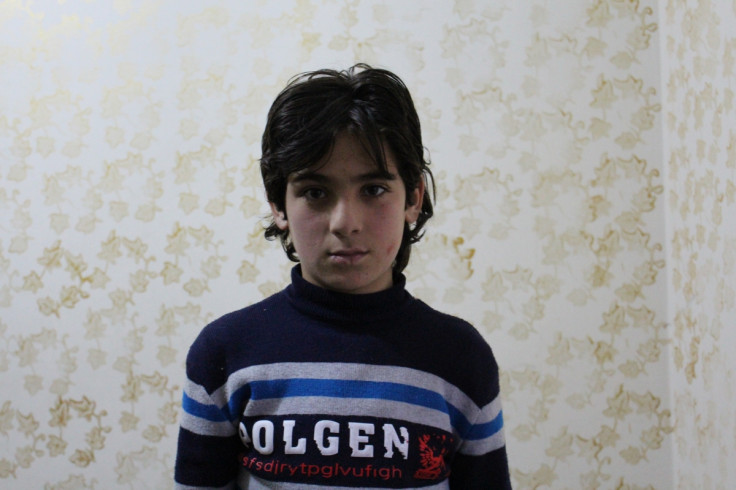Isis: 12-year-old who escaped Daesh-held Raqqa is forced to work as a child labourer in Jordan

In a small, cold apartment in the Jordanian capital Amman, Mohammed, a taxi driver from Raqqa, sees little hope of returning to the city on the banks of the Euphrates that he once called home. The spacious house he and his wife Fatima shared with their three children, including his eldest Ahmed, was forfeited to the Islamic State (Isis) when they fled in 2013.
The family has since grown to six and the rooms of the apartment are sparse. A cold stone hallway gives way to a carpeted living room, lined with faded brown cushions. In one corner sits a shabby brown sofa. The only decorations are Quranic verses hung on the walls.
Mohammed, Fatima and their children: Ahmed, 12; Aslam, 10; Asma, 8; Abdel Hamid, 4-months-old and Awash, an elderly Raqqa woman living with the family, cluster around a single gas heater that does little to reduce the early evening chill.
Ahmed is older than his age. He doesn't play with his peers in the street. He prefers to sit with adults and listen to conversations
Their daily lives feel the strain of soaring prices and debt. Ahmed, a thin and quiet boy, has taken a weekend job as a labourer on construction sites, working up to nine hours outside for as little as five Jordanian Dinars (JD) per day (£4.80). Fatima was forced to sell her gold ring after Mohammed stopped working seven months ago because of a back problem for which he needs surgery.
Their family life also bears the the weight of a war that has displaced more than four-and-a-half million and killed hundreds of thousands. Mohammed claims his father was killed recently in coalition air strikes targeting Daesh militants in the city.
The family fled two-and-a-half years ago for the sake of their children when IS shut the schools. The ascent of the terror regime in the city was already so assured that they had to avoid the militants' checkpoints. If they had been caught they would have faced a death sentence.
Mohammed explained that the family had to be moved out of Raqqa in a truck that carried sheep, using 1,000 JD (£971) to be smuggled out by a driver who knew routes that Islamic State would not be watching. He doubted such an escape would be possible now. "At the time security was not as strong as it is now. Now the place is completely under their control," he told IBTimes UK.
Mohammed said before the rise of IS in the city, fighting was constant between the regime, the opposition and extremist groups, with bombs falling across the rebel-held areas. "We were in the middle," he explained. As Isis took hold of the city, the price of household items like bread rose and eventually the schools were closed. "When Isis and the terror groups started the schools stopped, there was no future in that city," he said.
After leaving Raqqa the family made their way to Damascus, often changing cars along the way. Mohammed went to Turkey while his family remained in the Syrian capital to get the children's passports. The passports cost 700 JD each (£680) but allowed the family to cross by foot and legally over the border to Jordan.
In the Hashemite kingdom the family survived on a variety of handouts from the World Food Programme (WFP), the children's NGO World Vision and the work Mohammed did as a painter and decorator.
However, in the past seven months, in the wake of Mohammed's injury, Ahmed has had to work two days a week to help pay the family's rent, though it is illegal for Syrian refugees to work in Jordan, let alone children. Bringing in about 5-10JD working two days a week when he is not at school, Ahmed works on construction sites carrying smaller items and painting.
It is not an arrangement Mohammed or Fatima likes. "I don't like that he is working. I would rather have him focus on his education. It has become a necessity nowadays for us to have him work." The 50JD Ahmed's labour brings in in a month means the family can secure their 200JD rent when added to World Vision's 150JD cash assistance, allocated to the most vulnerable.
Generally, it is believed Ahmed is treated well and he says he is happy, but the amount he is paid depends on the effort he puts in at work. He doesn't answer when asked what it is like to be the only child on a construction site but his parents say he is mature for his age. "Ahmed is older than his age. He doesn't play with his peers in the street. He prefers to sit with adults and listen to conversations," they explain.
Mohammed says all his children deserve and need an education like children everywhere and, made visibly upset by the situation, he says: "The boy is too caring to not support his family. I really care about my children's education. We are not terrorists. we care about our children's future and we want to provide them with a decent future," he said.
- Callum Paton travelled to the Bekaa Valley in Lebanon courtesy of a non-governmental organisation.
© Copyright IBTimes 2025. All rights reserved.






















